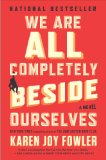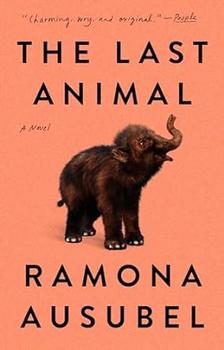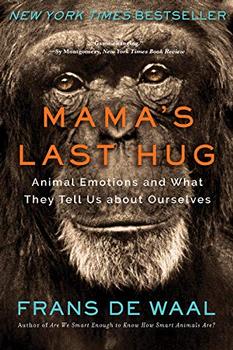Summary | Excerpt | Reading Guide | Reviews | Beyond the book | Read-Alikes | Genres & Themes | Author Bio

Karen Joy Fowler's novel We Are All Completely Beside Ourselves is a story about a family torn apart by the loss of one member. While that is not an unusual occurrence in novels about families, never have I read one in which the lost member was a chimpanzee. Loosely based on an experiment conducted in the 1930s by married scientists who attempted to raise a baby chimp along with their infant daughter, Fowler examines what it would be like for the human children who were part of such a family.
Rosemary Cooke is a fifth year college student who can't settle on a major because she is leading a most unsettled life. Having been the child who never stopped talking, she is now immured in a self-imposed silence lest anyone find out that she was once the "monkey girl." Fern, the chimp, who was a sister in every sense, joined the family when she and Rosemary were just a few months old and was sent away when they were six. A few years later their older, human brother Lowell, angered and unable to get answers from his parents, left home to find out what had become of Fern. It is 1996 and Rosemary has not seen him for ten years.
For both Rosemary and Lowell, growing up with Fern was a constant delight. Rosemary's very earliest memory: "…lying against Fern. I feel her fur on my cheek. She's had a bubble bath and smells of strawberry soap and wet towels. A few drops of water still cling to the sparse white hair of her chin. I see this, looking up from the shoulder I am leaning against."
While having a chimp for a sister was clearly a joy for Rosemary and Lowell, it was a challenge for their mother as Fern jumped from her father's desk to his armchair, climbed the banister and bookshelves, and twirled around in excitement. It would go so far that their mother used to say, "they are all completely beside themselves."
Fern learned sign language and her sister talked for both of them. When Rosemary began to acquire chimp behaviors, some of which stay with her for life, the idyllic life of a professor and his wife raising kids in Indiana farm country fractures to reveal the questionable limits of their experiment, not to mention the unknown interrelations of human consciousness in close proximity to that of animals.
I loved Rosemary's various voices. When she relates her college years, she uses the wry, ironic tone of a lonely student who does not fit into campus life. As she begins to tell about her early years with Fern and the confusing devastation brought about by Fern's departure, she captures the unreliable narrative of a young child's viewpoint. When Lowell reappears with the mystery of Fern's whereabouts solved, he has become a fierce animal rights activist, still full of anger and wanted by the FBI. As the memories she has suppressed begin to surface, Rosemary's alienated persona cracks and she recounts the suffering that leads her to recapturing at least a degree of the exuberant zest she once had with Fern.
How much and in what way should parents explain things to their children? What are the long range effects of highly unusual circumstances on those children and how do they process them? Whose memories are more reliable, the children's or those of the adults? These are the questions I pondered while reading.
But I never felt I was reading a book about "issues" because Fowler imbeds all of these realities in deft prose and captivating characters. She unravels a tale begun in the middle, by taking the reader through a young woman's memories and heartbreak to a believable happy ending. She captivated me completely.
![]() This review was originally published in The BookBrowse Review in June 2013, and has been updated for the
March 2014 edition.
Click here to go to this issue.
This review was originally published in The BookBrowse Review in June 2013, and has been updated for the
March 2014 edition.
Click here to go to this issue.

If you liked We Are All Completely Beside Ourselves, try these:

by Ramona Ausubel
Published 2024
A playful, witty, and resonant novel in which a single mother and her two teen daughters engage in a wild scientific experiment and discover themselves in the process, from the award-winning writer of Sons and Daughters of Ease and Plenty

by Frans de Waal
Published 2020
New York Times best-selling author and primatologist Frans de Waal explores the fascinating world of animal and human emotions.




Not doing more than the average is what keeps the average down.
Click Here to find out who said this, as well as discovering other famous literary quotes!
Your guide toexceptional books
BookBrowse seeks out and recommends the best in contemporary fiction and nonfiction—books that not only engage and entertain but also deepen our understanding of ourselves and the world around us.